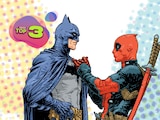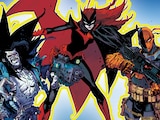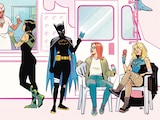The DC Universe has made immense strides when it comes to queer representation, especially over the past several years. Still, it would be remiss to celebrate the current state of DC and its LGBTQIA+ characters without honoring the pioneering work of writer Gail Simone on the Secret Six title in the late 2000s.
For those who aren’t familiar, the Secret Six are a dysfunctional team composed of former villains who survive by taking mercenary jobs wherever they can find them. The team has taken on several different iterations over the years, but in Simone’s second Secret Six series, it’s led by Scandal Savage, the daughter of Vandal Savage, and also includes Bane, Deadshot, Catman, Ragdoll and Jeannette. Simone was supported over the title’s run by a dream team of artists, including Nicola Scott, Carlos Rodriguez and Doug Hazlewood.

Simone’s Secret Six debuted in 2006 as a six-issue series, before returning in ongoing form in 2008 and again in 2014. One thing that stands out is how timeless it feels. As a queer person myself, I remember back in 2009 when the right for gay couples to even get married was a hotly contested issue. At the same time that LGBTQIA+ people were held at an arm’s length, at best, by mainstream society, Simone infused the queer characters of Secret Six with a palpable sense of empathy and love. Scandal Savage’s grief over losing her girlfriend, Knockout, was the emotional center of the series. Not once are we, as readers, ever supposed to look at the members of the Secret Six with a sense of revulsion because of their queerness. In fact, we more often than not end up side-eying Deadshot for making inappropriate comments during serious emotional beats.
The timelessness of Secret Six exists because Gail Simone wrote the team from an “inside” point of view, rather than that of an “outsider’s.” That is, even though the world in 2009 marginalized queer people on the basis of their sexuality or gender identities, in the world of Simone’s Secret Six, that wasn’t the case. They were outsiders because of their sordid pasts, sure, but Simone didn’t treat Scandal Savage, Knockout, Jeannette and Catman’s sexualities as an aberration. Their sexualities never had to be explained or “legitimized” to straight audiences in a condescending manner. They were just who they were. In this sense, when fans read Secret Six, they were invited into the experience of being queer. This made the book a standout lesson in empathetic storytelling.

This sense of empathy was brought to life beautifully through Bane’s supportiveness of Scandal Savage. While Scandal was a binge-drinking mess in the wake of losing Knockout, Deadshot made a crass comment bemoaning how the only woman on the team was “bent for other chicks.” Bane defended Scandal by telling Deadshot, “Do not insult her. Love is complex.”
Not only is that a wonderfully “Bane” statement to make, it also sets the tone for how Secret Six approaches queer relationships, and queer people themselves. They’re complex, compelling and all the more human.
Lastly, while Scandal Savage grieves the loss of her girlfriend, it wasn’t depicted within the same spectacle of tragedy that had dominated so many visions of queer people in popular culture at that time (the “bury your gays” trope comes to mind). Scandal’s story didn’t end with the death of Knockout, it only had just begun. Seeing Scandal work through several stages of grief with the support of her teammates departed from a terminal, fatalistic view of queer relationships. Instead, Scandal was a survivor who learned how to accept other forms of love into her life after losing her romantic partner.

This further infused Scandal’s character with a sense of humanity that had been absent from most superhero pop culture of the time. While, yes, queer people are susceptible to tragedy because of oppression and bigotry, tragedy itself isn’t the marker of a queer experience. Instead, flourishing despite those tragedies is what it means to be queer. Thanks to empathetic characters like Bane, Scandal never had to look far to find people looking out for her.
Gail Simone’s Secret Six is led by a sense of humanity and an immense love for individual messiness. It still remains a refreshing read because it isn’t interested in assimilating its queer characters into a “respectable” mold for straight audiences. Scandal Savage enters the story in 2008’s Secret Six #1 by throwing up everywhere. We all have our bad days! And isn’t that the most human lesson that we could learn from a ragtag group of reformed villains?
All three of Gail Simone’s Secret Six series can be read in full on DC UNIVERSE INFINITE.
Jules Chin Greene writes about comics for DC.com, and his work can also be found at Nerdist, Popverse and Multiverse of Color. You can follow him on Twitter and Bluesky at @JulesChinGreene.
NOTE: The views and opinions expressed in this feature are solely those of Jules Chin Greene and do not necessarily reflect those of DC or Warner Bros. Discovery, nor should they be read as confirmation or denial of future DC plans.















